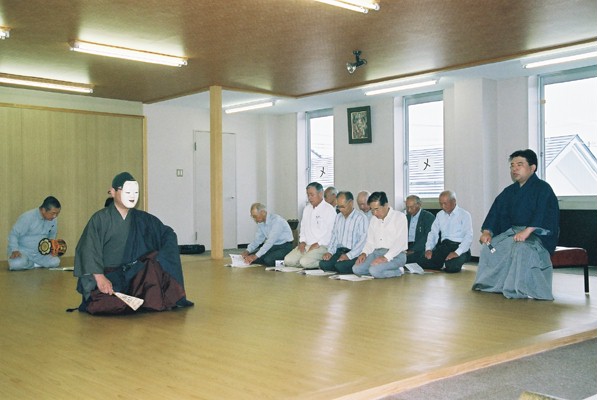
●秋の演能会 日時 10月10日(祝) 10時00分開演
場所 文化センター 入場無料
舞囃子「玄象」 シテ 渡部マサ子
大 浜崎幸子 小 山田風月 太 佐藤 馨 笛 平山 昇
地謡 小林 忠 河合正弘 湯田真佐弘 長沼常哲
能 「経政」(宝生流) あらすじstory
シテ 坂内庄一
ワキ 松尾幸生
大 山田風月 小 折笠成美 笛 堀 篤子
地謡 渡部藤之丞 上野正義 皆川米作 鈴木直寿 稲村忠兵エ 中村寿男 伊藤 毅 平林光雄
後見 丑米義弘 小野木 保 平山 昇
舞囃子「猩々」(宝生流) シテ 船木真一
大 平山 昇 小 山田風月 太 一条正夫 笛 岩淵健一
地謡 伊藤 正 松川善之助 佐藤昌一 佐藤信英
●経政 二番目(修羅)物。時は秋。所は京、仁和寺。
修羅道とは武士が死後に落ちる地獄の一種で、そこは永遠に殺し合いが続く苦しみの世界です。
平家一門の平経政は琵琶の名手であり貴公子である。仁和寺御室の守覚法親王(しゅかくほっしんのう)に寵愛され、「青山」という琵琶を与えられていたが、「青山」を仁和寺に残し、一門と共に西に向かう途上、一ノ谷の合戦において討たれてしまう。仁和寺では守覚法親王の命により、経政の霊を弔うため管弦講を催します。管弦講の中に若武者姿の経政が現れ、妄執に惹かれて人間世界に戻ってきたことを語る。ワキの行慶が声をかけると、自分は経政だと名乗るが影は幽かで声ばかりが残る。行慶の問いに経政は答え、何不足のない日々を送ったことを懐かしみ、姿は見えないながら「青山」の琵琶を弾く(シテは持ち物として琵琶を持つわけでない。観客は琵琶を弾くシテを思い浮かべなければならない)
経政は俄雨と聞き違える松風の音の中、中国の伝説や近くに見える衣笠山などを思い描きながら琵琶を弾き続ける。心が高揚し経政はカケリを舞うが、突然一ノ谷で討たれた無念の念に襲われる。その恨みの思いがあるために、たちまちに経政は修羅道という地獄に堕ち、阿修羅王の兵と帝釈天や梵天の兵との果てしない戦いに巻き込まれ、激しく戦う。やがて経政は自分のその身を恥じ、暗闇に紛れて姿を消す。
●Tsunemasa.
This story is called Shuramono and is the second program. Shuramono(dou ) is one of the hell into which the samurai falls after death, and is the world of suffering to which killing one another continues there through all eternity. The place is Ninna-ji Palace in autumn.
Heike family's Tairanotsunemasa
is an expert of the Japanese lute and is a young nobleman. He
was loved by a prince Syukakuhossin, and given a Japanese lute
"Seizan". He deposited Seizan to Ninna-ji temple, and
went to the western front with the family because he did not want
to lose the rare utensil "Seizan" by the fight. However,
he was killed in the battle at Itinotani on the way.
Kangenkou ( a funeral with the stringed instrument) for the soul
of Tsunemasa is held in Ninna-ji temple by direction of the prince
Syukakuhossin.
Kangenkou continued to midnight,and Tsunemasa of the appearance
of a young samurai appears while the shadow is faint. He talks
that he returned to the human world for the obsession. Only his
voice hears into the faint shadow. He brings up and picks the
lute "Seizan" and speaks that he spent satisfied and
joyful in this world. He answers that he is Tunemasa when Gyoukei
of the Waki post calls him. He keeps playing the lute while imagining,recollecting
various scenes, and spends the time of bliss. Suddenly the anger
and regret about having been killed by the fight welled up in
him. He dances Cakeri before long. Soon he is caught up into an
unmeasured fight against Asyura and Taisyakuten's army and fights
violently in the hell named Syuradou. He finds himself changed
into an ugly appearance and is ashamed of it. And soon he is diverted
to the dark and disappears when daybreak will begin to become
near before long.

|
|
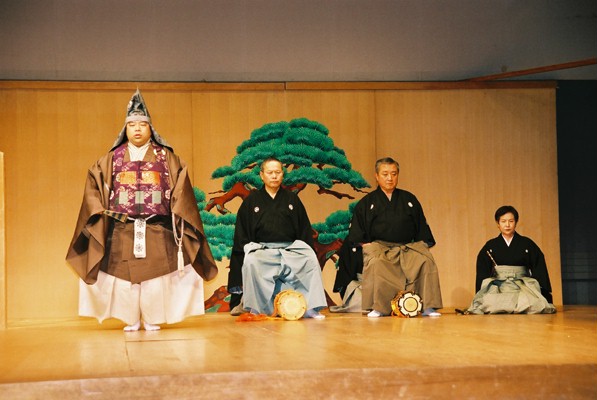
|
|
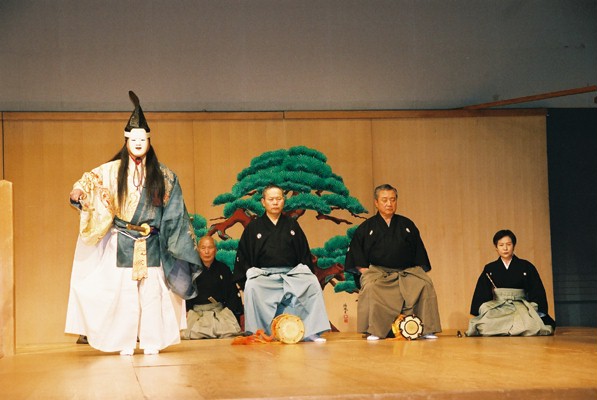
|
|
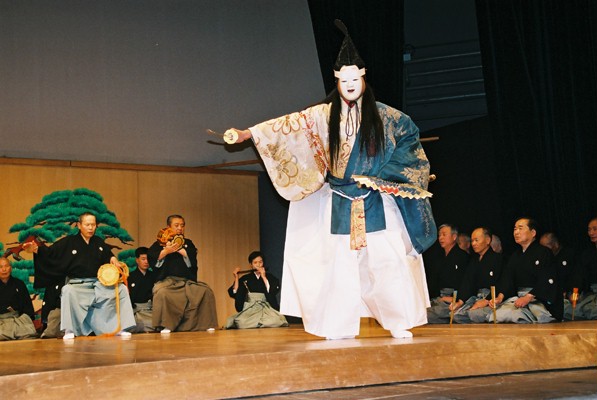
|
|
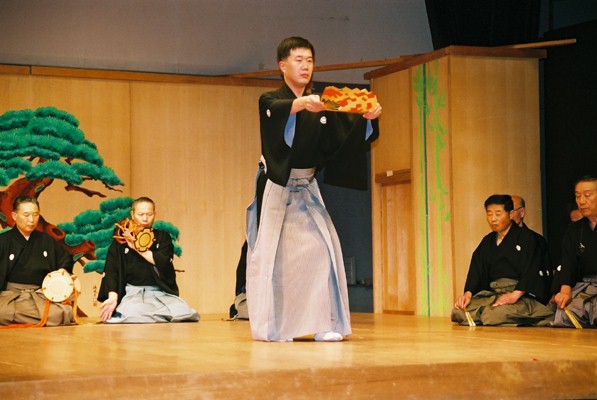
解説 あらすじ 三番目物また四番目物。時は冬。所は大和葛城山。
かつて、葛城山の一言主神は役行者(えんのぎょうじゃ)の命令に背いたので、不動明王の索により蔦葛により身を縛られてしまった(日本霊異記)。この伝説をふまえている。
出羽の羽黒山の行者が葛城山に来るが、雪に見舞われる。木陰に休んでいると薪を背負った里の女が現れる。雪の積もった笠、白の装束を纏った前シテの出で、観客は雪の舞台であることを感じ取ります。女は行者を伴い家に導く。夜寒が強まったので標(しもと・薪)を燃やして暖をとる。女は標の名の由来を説明する。夜が更け、行者が勤めを始めると、女は行者に自分を三熱の苦しみから救ってくれるように頼む。行者が不審に思っていると女は「自分は葛城の神で役行者の命令を遂行できなかったために蔦葛で身を縛られ、三熱の苦しみを与えられ、岩屋に置かれているのだ。」と言い、呪縛を解く祈祷を頼み姿を消す。
行者が祈っていると、葛城の神が女体の神となって現れ、その姿は高天の原の岩戸から出てきた天照大神の姿ながら、蔦葛で身を戒められている痛々しい姿であった(被り物の天冠に蔦をつけて縛られていることを表現)。女体の神は高天原の大神への心を込め、神楽歌を歌い、大和舞(序之舞)を舞う。葛城の神は月の光の下の雪景色の中にしだいに自分の醜い顔が現れるのを恥じ、夜が明けぬ先に姿を消し、再び岩屋に戻って行く。
●Kazuraki
Noh Kazuragi is made from the myth as follows. A godness of Mt Kazuragi was bound to the rock by the rope of Hudohmyohou with Tsutacazura (very heavy ivy) because she disobeyed the order to build the bridge between the mountains.
An ascetic in Mt Haguro comes
to snowy Mt Kazuragi. He is taking a rest,suffering the heavy
snow, under the tree. A local woman, shouldering the firewoods,appears
to there. She takes along him to house in the valley because it
become cold night.
She burns Shimoto(the firewood)for warmth. She explains the origin
of the name Shimoto. She asks the ascetic to save her from suffering
of three-heat in Buddhism when the night grows old, and the ascetic
starts praying. She says "I am a god in Mt Kazuragi and now
am suffering of three heat that was given by Hudohmyohou,and I
was left in the cave".
And "My body have been bound to the rock because I disobeyed
Ennojyoujya's instruction"she said.
She asks for him to save her from the suffering. She appears when
he is praying till midnight.
Her appearance is just like as noble greatest god Amaterasuookami
who came out from Amano-Iwato(the door made of large rock) of
Takamagahara(heaven). But it was a miserable appearance that the
body had been roped with Tstacazra. She identifies with Amaterasuookami
and she sing a god song dancing Yamatomai.
The godness of Kaduragi is ashamed of her ugly face that becomes
clearly in the snow scene under the moonlight and she returns
to the cave again before the morning doesn't dawn.
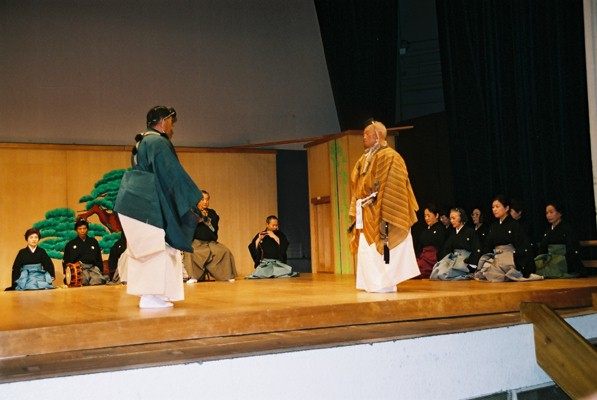
|
|
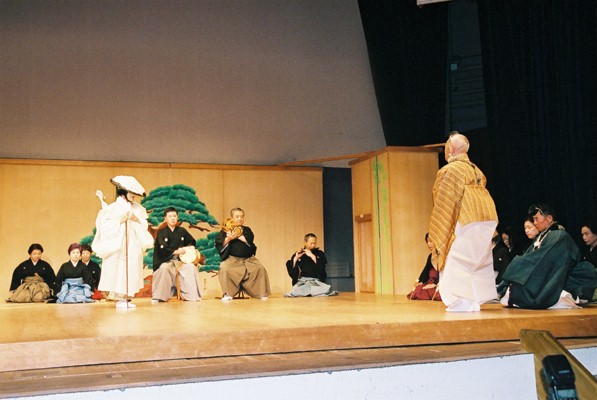
|
|
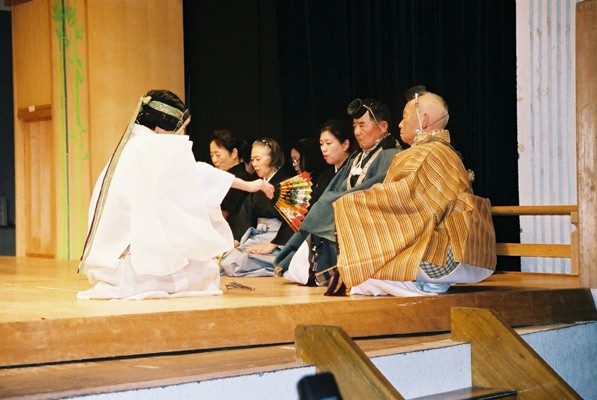
|
山伏達が夜の勤めを始めると、女は正体(葛城明神)を明し、加持を請うかと見えて姿を消す。 |
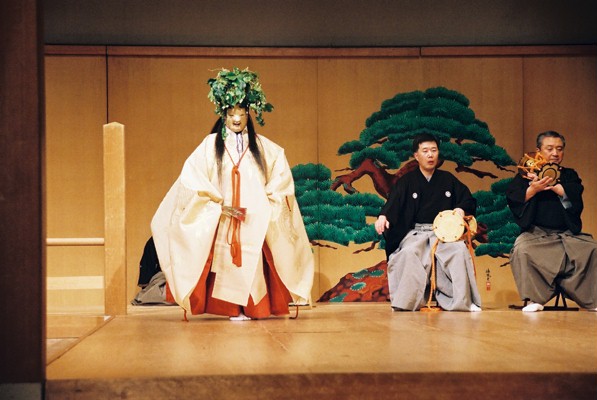
|
やがて夜が明けると、姿を見られる恥ずかしさに磐戸の中へと消えて行く。 |
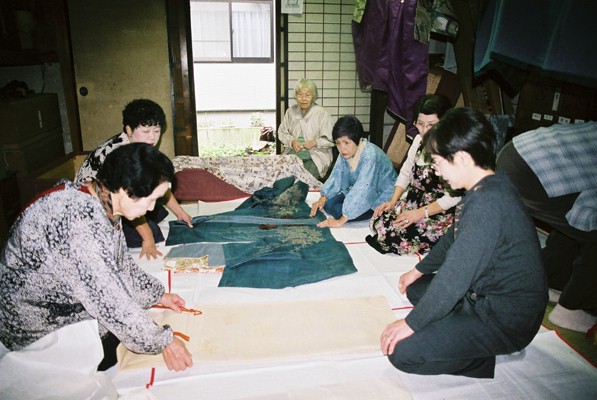
|
上級者が襟側、下級者が裾側に位置して能装束を大事に畳みます。 |
これは建久4年(AC1193)の5月半ばの話です。鎌倉幕府の源頼朝公は、富士
の裾野での大規模な狩りを計画し、諸国の武将達に狩のお供をするように命じます。曽我十郎祐成と弟五郎時致の兄弟はその狩りに参加し、このまたとない機会を利用して父の敵である工藤祐経
を討つ計画をたてます。すでに死を覚悟した曾我兄弟は、最後の別れをするため、曾我の里に住む母をたずねます。母は兄の祐成に会って大変喜びますが、勘当した弟のは会おうとはしません。兄の祐成は時致の勘当を許してくれと母に懇願します.
しかし、母はますます怒って、執り成す兄までも勘当すると言います。昔、彼らの父は狩のときに工藤祐経に殺されたのです。だから、二人にとって、狩は敵討ちを意味するのです。しかし、母は言外の意味に気がつきません。二人は落胆して、恨み顔で立ち去ります。彼らの去ったあと、狩の意味することにはっと気づいた母はあわてて大声で二人を呼び止めます。ようやく兄弟の心が母に通じたのです。母と子は門出を祝って杯を交わします。今生の別れを胸のうちにしながら、兄弟はそろって祝言の舞を舞います。やがて、二人は年来の敵を討って、武門の名声を富士の高嶺よりもさらに高く上げようと、狩への死出の旅路に出てゆきます。<文責、鈴木>
この曲は能には珍しく劇的色彩が強く、見所は勘当を許す人情味の場面及び二人の役者が颯爽と舞う(相舞)芸の競合でしょう。
●Kosodesoga
The story of the Noh play Kosodesoga
takes place in May of the fourth year of Kenkyu (1193). Minamoto
Yoritomo, then the leader of the Kamakura Shogunate, planned a
large-scale hunting trip in the skirts of Mt. Fuji, ordering generals
across the nation to participate. Soga Juroh Sukenari and Soga
Goroh Tokimune, two brothers, took part in the hunt, with the
ulterior motive of attacking and killing Kudou Suketune, their
father's enemy. The brothers, set upon death of their enemy or
their own death, visited their mother in Soga to bid her a final
farewell. She was gladdened by Sukenari's visit, but refused to
see Tokimune, who had been disinherited by the family. His older
brother appealed on his behalf for his mother to see him.
However, the mother became increasingly infuriated and decided
to disinherit Sukenari as well. Long before, Kudou Suketune killed
their father on a hunting expedition, so the hunting trip was
an opportunity for revenge to the two brothers, but the mother
seemed not to understand the meaning of the trip. The brothers,
heads hanging low, headed towards the hunt. Shortly after their
departure, the mother realized the meaning of the hunt and in
a panicked voice called after her sons. Finally the sons had gotten
through to their mother. Together they celebrated the brothers'
departure with cups of sake.
The brothers danced with joy, knowing they would soon leave this
world. In the end, the brothers killed their enemy and their story
was sung in voices that were heard beyond the heights of Mt. Fuji.
The view point are the scean of the permission of disinherit
and the duet dance.
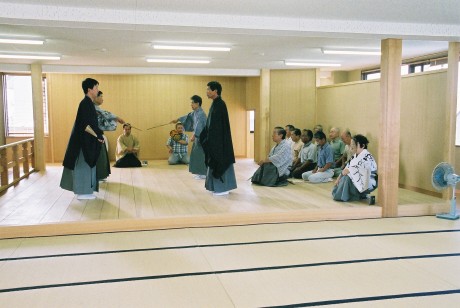
|
本番さながらの緊張感の中、「小袖曽我」を通して演じます。一曲を通し終わった後に、厳しい指導や白熱した議論が行われる事も... |
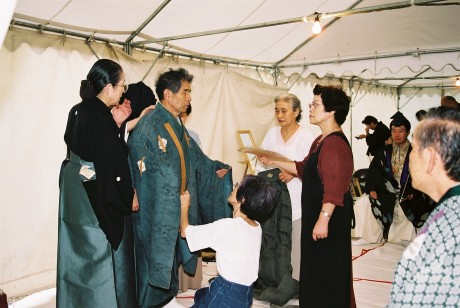
|
今回の能「小袖曽我」は役の人数が多い(計六名)ので着付け方の皆さんは大忙し... |
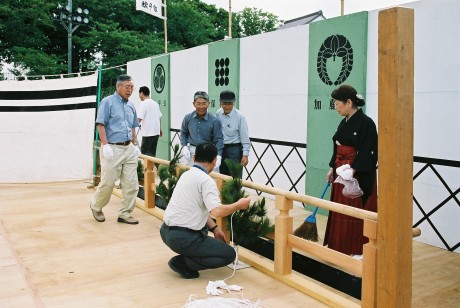
|
男性陣は舞台の柱と提灯、橋懸りの欄干、背景の松、などの設置。女性陣は見所の設置、舞台掃除など。 |
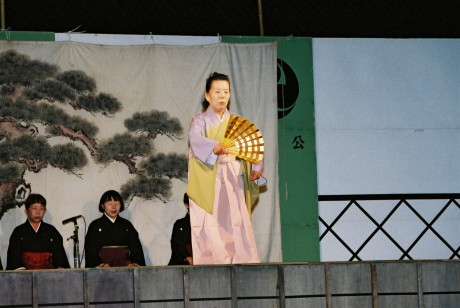
|
|
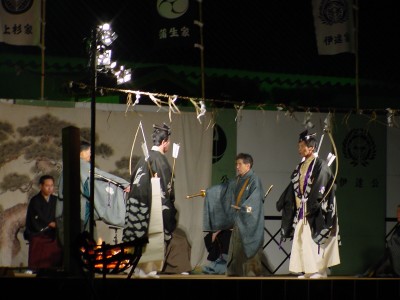
|
囃子方、母と従者が座に着くと、勇壮な次第の囃子で曽我兄弟と従者(團三郎と鬼王)が登場し、 敵討ちへ向かう意気込みを謡い(ここの謡は長くて覚えるのが大変!!)ます。 |
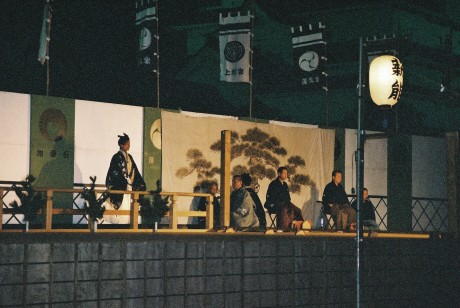
|
|
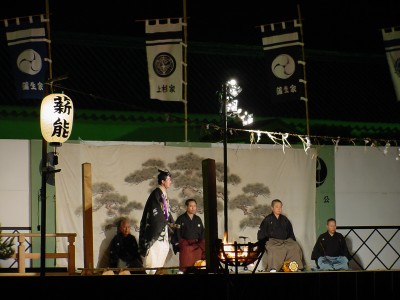
|
|
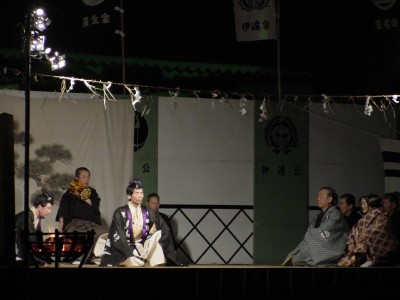
|
しかし兄は、弟が箱根寺で父母を思って過ごした日々を語り弁明します。 |
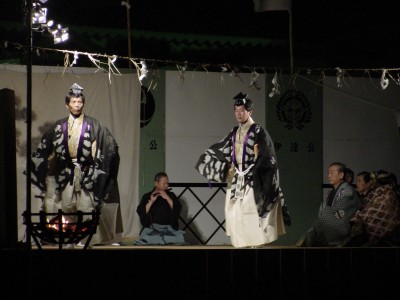
|
この能「小袖曽我」は、兄弟での相舞(二人でほぼ同じ型を揃えて舞う)が最大の見モノですが、演者にとっては最大の難所です。 |

|
|

|
|
●東北
能「東北」は平安朝の女流歌人和泉式部伝説を素材とした作品です。時は春、所は東北院。三番目物。
東国から都に上ってきた旅の僧が折しも美しく咲く梅に見入っていると、どこからともなく美しい一人の里女が現れる。女はこの梅は今「和泉式部」、「好文木」また「鶯宿梅」とも呼ばれるが、昔ここが上東門院の御所であった頃、和泉式部が植えて「軒端の梅」と名付けたのだと語る。さらに女は奥の方丈は和泉式部の寝所を残したものであり、梅は今もなお昔の主を慕うように美しく香るのだと言い、自分はこの世の人ではなく、この梅の主、和泉式部であると告げて花の陰に消え失せる。
僧が法華経の譬喩品を読んでいると、先ほどの女が美しい上臈の姿で現れ、かつて藤原道長がこの御所の前を牛車で通りながらその譬喩品を読経した時、自分は「門の外 法の車の音を聞けば 我も火宅を出でにけるかな」と詠んだが、その功徳によって死後火宅の苦しみを受けずに、歌舞の菩薩となったのだと語る。式部は「和歌の徳」を述べ、東北院が霊地であることを讃え、静かで美しい舞(序之舞)を舞い、やがて僧に暇を請い、方丈に姿を消す(文責 山田和彦)
●Touboku
Noh Touboku is made from the legend of Izumi
Sikibu, a female poet at the Heian era . The place is Touboku-In
in spring (In means aristocrat's villa and palace).
A Butthist monk who has came to the capital Kyoto from the eastern
country, and he is gazing to the plum tree( named Izumi Sikibu)
that blooms beautifully. A beautiful woman shows up out of thin
air and tells him. She says that this tree was named Nokibanoume
(The plum tree planted in the vicinity of the eaves is meant)
though this is called Izumishikibu (a love poet with famous Heian
age) or Ousyukubai (The plum tree to which the bush warbler stops
is meant). Izumishikibu planted this when here was Jyotohmon emperor's
palace in old times. In addition, the woman talks about the bedroom
where Izumisikibu slept in the interior.
The plum tree smells beautiful as still yearned for an ancient
hostess. And she says, "I am not a person of this world but
am a hostess of this plum tree, and my name is Izumisikibu"
and vanishes secretly to the shade of the flower. The woman ahead
shows up by the appearance of a beautiful lady.
She talks. "The worry about my love were cleared when I heard
the sound of passing oxcart and Mitinaga's sutra recitation of
Hokke from the outside of the gate"
Now I have never recieve the suffering of the evil passion after I died. It is the reason why I had read the Japanese poem piously. Therefore, I was able to become Bosatu ( Buddha under song and dance life). She continues her talk about the effect of the Japanese poem making. She praises that Toubokuin is a sacred place of the Japanese poem. And, she dances Jonomae, and disappears to a small room before long quietly and beautifully.(by ksk)
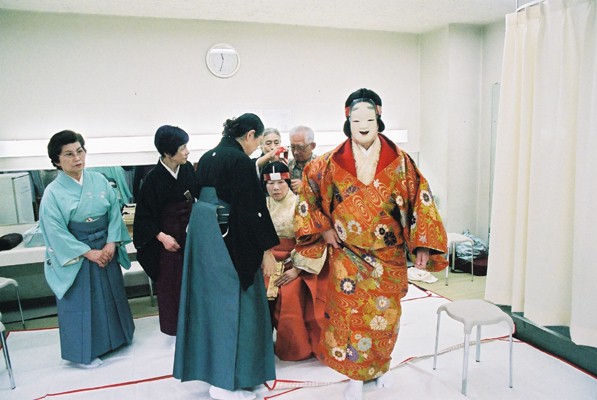
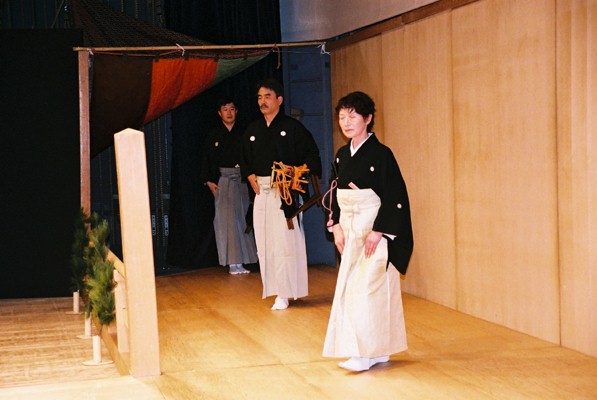
| 前シテはすでに完了。後シテの着付け中 | お調べが止み、幕が上がり、まず囃子方が舞台に入る。 橋掛かりで見所正面を向く。緊張の様子が伝わる。 |

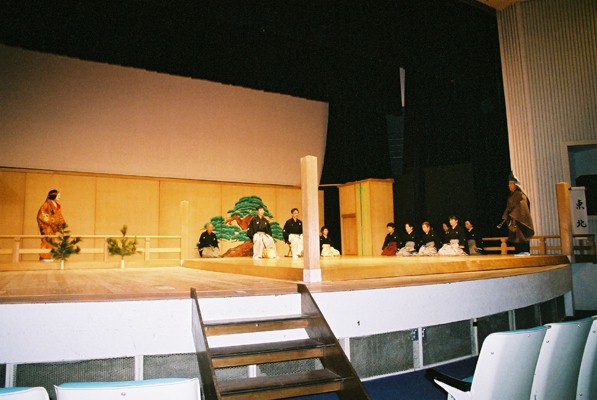
| 囃子方とほぼ同時に舞台右より地謡が入っている。 ワキは囃子方に続き舞台に入りワキ座に座る。 | シテとワキが、「梅の木」について話している。シテは和泉式部が植えた軒端の梅であるといい、僧にお経を読んで欲しいと頼む場面。シテ座の隅柱を梅に見立てて話をしている。 |
| 前シテがワキに「軒端の梅」についての、詳しく語り、自分は梅ノ木の主の和泉式部であると言い、梅の木陰に消えてしまう(舞台から去る。中入り前) | 後シテ、序の舞(ゆったりした典雅な舞の種類。所作に表意性はない)。上の写真は地謡の内容に合わせ舞うところ。「鳥は古巣に帰るぞとてーー」 |
舞囃子「雲林院」
シテ 木村玲子
大鼓 角田久美子小鼓山田風月 太鼓一条正夫 笛石田桂子 地謡長沼常哲 河合政弘 湯田真佐弘 小林 忠
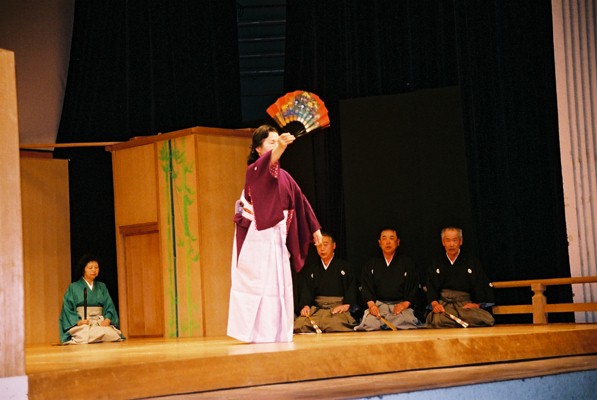
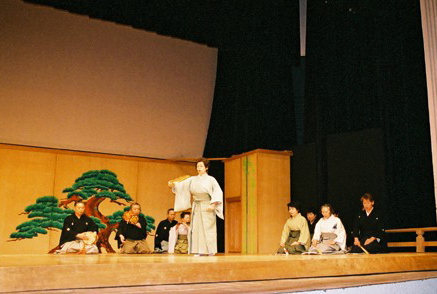
舞囃子「芦刈」
シテ 渡部静子 大鼓 平山 昇 小鼓 折笠成美 笛 五十嵐久子
地謡 山田智子 山田ミヤ子 馬場律子 星茂登美
大塚利衛 渡部妙子
能 「黒塚」
前シテ 玉川おくに 後シテ 平山 昇 ワキ 船木真一 ワキツレ 木村武晴
大鼓 坂内庄一 小鼓 折笠成美 太鼓 佐藤ヨシカ 笛 山田和彦
地謡 鈴木圭介 佐藤信英 平林光雄 星英男 稲村忠兵エ 中村寿男 伊藤毅 佐藤昌一
後見 松川善之助 小野木保 丑米義弘 一条正夫 上野正義 伊東 正
装束方 丸山美伊子 岸英一郎 小野木和子 佐藤ヨネ 森田ルリ子他
●黒塚は「安達ヶ原の鬼婆伝説」を素材とした作品です。時は秋、所は奥州安達ヶ原。五番目物。
那智の東光坊の阿闍梨(あじゃり)祐慶は、所願成就のため本山の那智を出て諸国廻行の修行に出、一行は陸奥の安達ヶ原にやって来る。日も暮れ宿を取ろうとしますが人家が見えない。その時暗がりの中で遠くに灯りが見えたので、一夜の宿を借りるために立ち寄ると、家には女主人がいて「あまりにも見苦しいので宿を貸すことが出来ない」と応える。祐慶は何度もお願いする。女主人はその都度断るが、あまりにもいたわしく思いとうとう宿を貸し、茅筵で寝床を用意する。祐慶は礼を述べて室内に入るが、片隅に見慣れない道具があるので、「それは何に使う道具か」と尋ねる。女主人は「それは枠かせわと言って自分のように卑しい者が麻を紡ぐための道具だ」と答える。祐慶は「麻を紡ぐ作業を見せてほしい」とお願いする。女主人は「旅人にお見せするようなものではない」と恥ずかしそうに言いながらも、月影が差す部屋の中で糸を繰り始める。糸を繰りながら、女主人が「車が廻れば糸が繰られ、繰り返し繰り返しするだけで尽きることがないように、人の一生も浮き世を巡る物憂さから離れることが出来ないことだ」と涙を流す。そして「糸づくし」と言われる秋の詩情を感じさせる歌を謡い、糸のように細く長い命のつれなさを託ち泣き崩れ、糸を繰るのを止める。女主人は夜寒がつのったので裏の山に薪を採ってくると言い、祐慶に「自分の留守中に決して隣の部屋を覗いてはいけない」と念を押します。女主人が出かけると、祐慶はその禁を破って隣の部屋を覗いてしまう。そこには数え切れないほどの屍が積まれ、おびただしいほどの血が流れていた。祐慶はここは鬼のすみかであったと肝を消し、一行は慌てて逃げて行く。
そのとき、本性を現した鬼女が現れ「決して覗くなと言ったのに約束を破られたこの恨みを晴らさないではおれない。一口で食ってしまおう」と襲いかかる。祐慶は必死の祈りでかろうじて鬼女を調伏する。やがて鬼女はすさまじい声を残して姿を消す。
見所は、前段の糸を繰りながら秋の情趣をしみじみと謡い人生のつれなさを嘆く「静」の場面と、後段の祐慶と鬼女の対決、恨みを晴らせないまま次第に調伏されていく鬼女の悔しさを表現する「動」の場面にある。(文責 山田和彦)
●Krozuka
Noh Krozuka is a work made from Adatigahara hag
legend. The place is Adatigahara in autumn ( current Fukushima
Prefecture). A Buddhist monk of Nati ( current Wakayama Prefecture),
Ajyari Yuukei and his followers go out to the travel for the purpose
of the training and praying buddhist temples.
The day grew dark, when they arrived at Adatigahara(wasteland)
on the way of the travel. They try to take the hotel but there
is not a house either. They find a light far away, and go to borrow
the lodging for one night. There is a mistress in the rude house
and she refuses their offer ,saying that "It is not possible
to lodge because here is too unsightly " When Yuukei appeals
her for the lodging many times, at last she approves the lodging.
She prepares the bed with Kayamusiro (a kind of the carpet that
is knited from the grass ). He finds a strange tool to the corner
of the room, and he asks her , "Is this a tool used for what?"
She answers. "It is called Wakukasewa. It is a tool for a
person as poor as me to spin hemp" She begins to turn the
string in the room that the moonlight opens. She mutters while
turning the string, and throws tears. "While the spining
wheel is turned, the string never stop turning. Human being cannot
apart from the worldly dull and gloomy as like as the string"
She chants the song that makes the poetic sentiment of autumn,
and grieves for a thin,long life like the string. She stops the
spining finally.
Because it becomes cold night , she says that I will take the
firewood from the hillback. "Don't peep into a next room
in my absence" However, he breaks the prohibition, and peeps
into a room after the woman goes out.
A lot of corpses were piled up there, and the stream of the blood
were vast all over the floor. He learned that the demon lives
in this rude house. They are terrified and they run away. She
becomes demon's appearance because the secret was exposed by him.
You violated the promise although I told that you must not to
peep into her room. "It is impossible that my grudge is not
dispelled. I will eat you at a stretch". She attacks them
fiercely. When he recites desperately the Buddhist scriptures,
the magic of the ogress has gradually becomes weak. The ogress
left a terrific voice and will disappear before long.
The viewpoint of the former steps is a scene of "Quietness";
the woman grieves for an empty,bitter life while turning over
the string. The viewpoint of latter part is a scene of confrontation
"Movement"between Yuukei and the ogress. The scene expresses
mortifying gradually cursed without working off a grudge of the
ogress.(by ksk)
| 装束をつける順序も軽い役のほうから。ワキの着付け中。シテの素顔。緊張はこれからだ。舞台つくりや、装束方も、囃子方も全部本会の会員。 | ワキとワキツレが情景や次第を説明している。布で覆っている作り物はあばら屋、中に前シテを隠して舞台に運ばれる。運ぶのは後見人の役目のひとつ。このあと覆いの布を剥がし、家の中の前シテが観客に姿をあらわす。 |
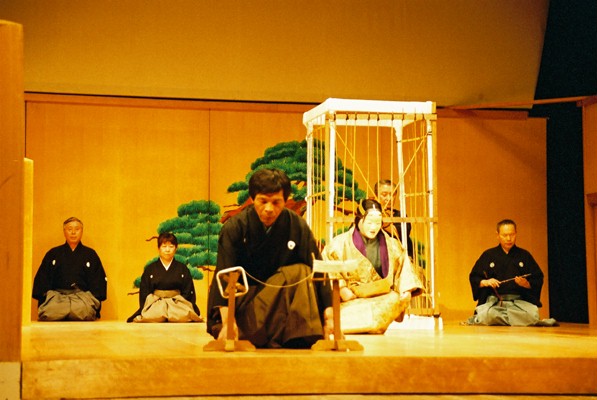
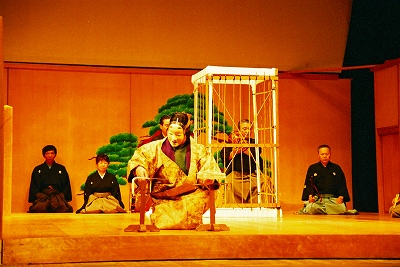
| 枠かせ輪(糸巻き)を運ぶ後見人。また、役者が台詞を度忘れした場合などもそっと教えてやる。後見人は能舞台の経験豊富な人が勤める。 | 前半の見所、世のはかなさを嘆く、静の場面 |
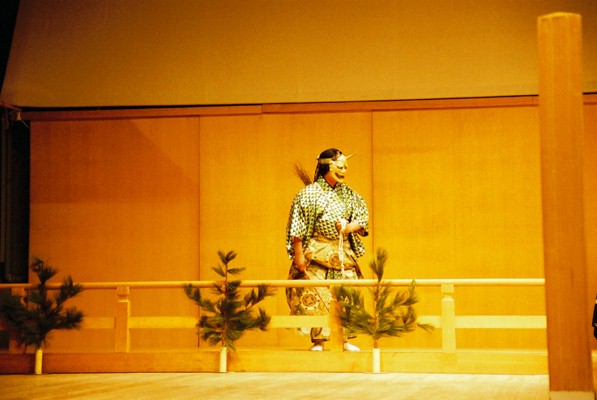
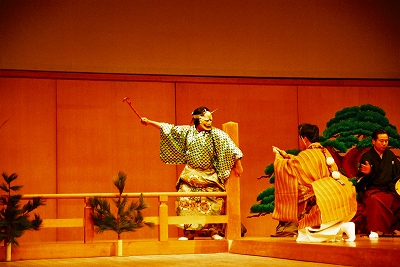
| 薪を背にして、鬼の姿となって後シテの登場。約束を破った僧に怒り襲いかかる後半のクライマックス、動の場面のスタート | 舞の種類で言う「祈り」の場面。攻撃・抵抗と祈祷の一進一退写真は鬼女の怒りを僧達は必死になって調伏したため、鬼が弱りはじめ、柱に手をやり漸く立っているところ。 |
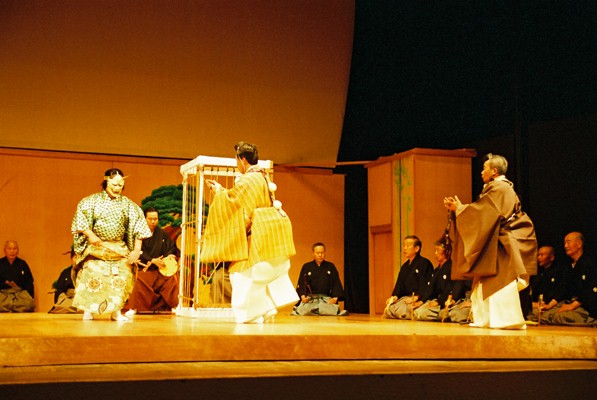
| 調伏により、鉄杖を振り上げる力も弱くなってきた。 | 鉄杖はすでに手から離れ、扇を持って退散寸前の場面。僧たちはワキ座に戻って座っている。 |